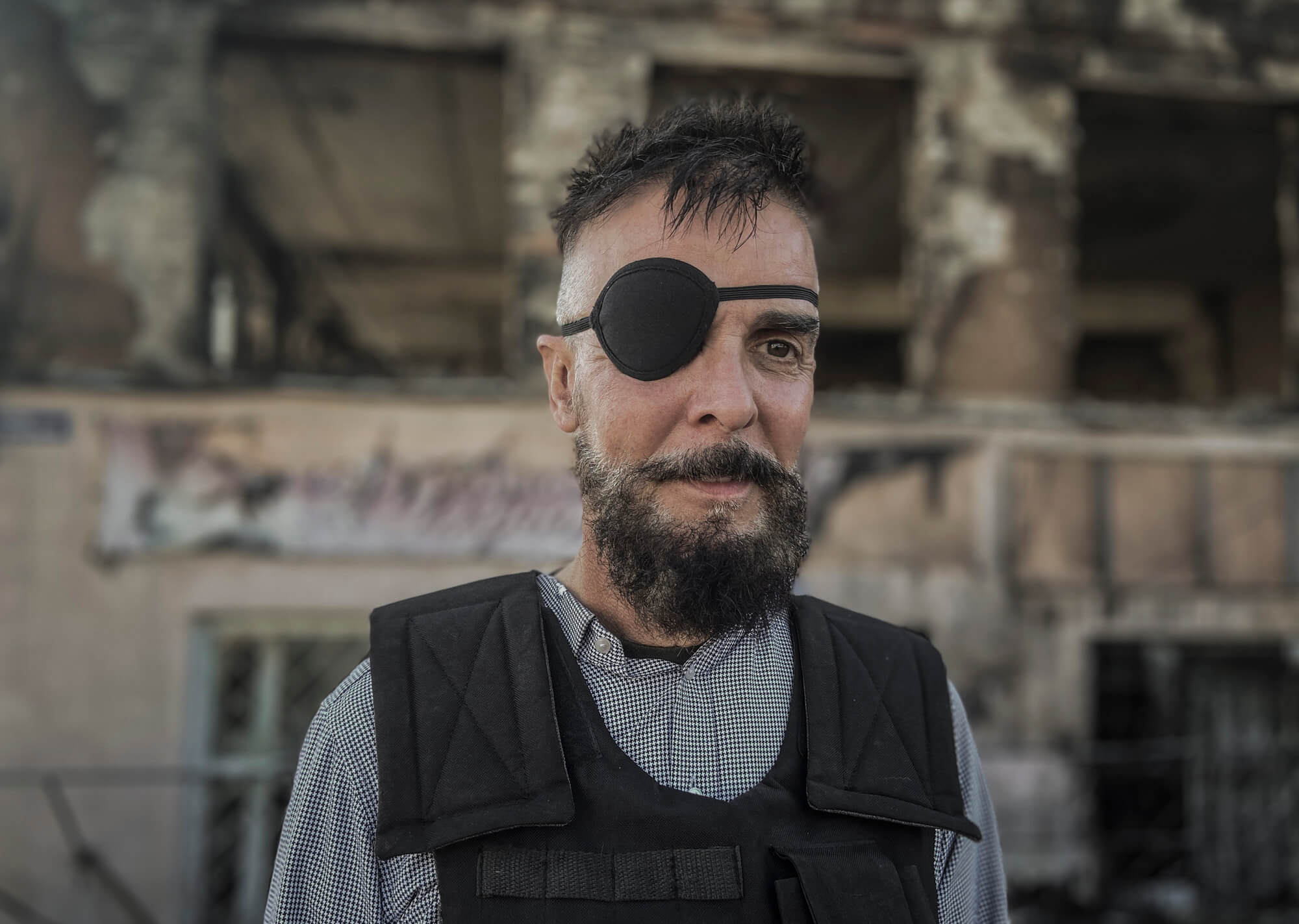
This is Dave, I’ve Come to Save You
The smell of rotting flesh hits our noses even before we see several bodies by the side of the road. One of them, half-burnt, is lying next to a smashed-up car, and another one can be seen a bit further in the grass. Nearby, under the still warm autumn sun, lie the decomposing carcasses of pigs killed by shrapnel.
Since February 27—just 3 days into the full-scale invasion—the occupiers have held the town of Kupyansk, a railway hub 50 kilometers from the Russian border.
Ukraine’s defense forces liberated this town in the Kharkiv region less than a week ago. In a few days, the military will remove the bodies of the Russian soldiers killed during the mop-up and the remains of innocent pigs from a local farm destroyed by artillery fire. In the meantime, this gory scene scares the locals, who have been waiting out the battles in basements and cellars and, for the first time in months, are finally daring to go outside.
After the liberation, several mass graves of tortured local residents were discovered in the town, as well as a destroyed convoy of civilian cars between the villages of Kurylivka and Pishchane. The Ukrainian investigation established that on the morning of September 25, Russians shot six cars and a GAZelle minibus there. In the act of terror, 24 people died, including 13 children and a pregnant woman. All of them were just trying to flee the warzone.
The authorities have been evacuating locals from the frontline areas since Russia first invaded in 2014: the National Police, the military, the State Emergency Service, and employees of the Ukrainian Railways evacuate civilians and their pets by buses, trains, and personal vehicles. Officials find special transport for people with disabilities, and carry old people and children out of their houses, but, despite their best efforts, cannot keep up with the number of people in need. Thus, volunteers also jump in to help at various stages of evacuation.
The fighting was still ongoing around the newly liberated Kupyansk when I arrived there with one of these volunteers. Dave Young, a 56-year-old Briton, does not speak Ukrainian, but he memorized one phrase: “This is Dave, I’ve come to save you.”
“The Pirate”
“We are on an evacuation mission, my friend. And this girl beside me is a journalist. We’ve got nothing forbidden, the trunk is empty, yep,” Dave quickly tells the checkpoint guard in broken Russian through the window of our car.
The military man frowns in response, looking suspiciously at Dave from Britain.
“Have you got any papers?” asks the soldier. “On what grounds are you carrying out the evacuation? Where from? Where to?”
“We are going to Kupyansk, then Shevchenkove—we get the people, you check the documents, and we’re off to Kharkiv. I’ll be going back and forth today. I’m a volunteer, my friend,” Dave gets out of the minibus and shows his Ukrainian residence permit. “I’ve been here 16 years, my friend. The war is on, I’m a man, they need help, you understand? Here are the addresses,” Dave takes out a graph paper notebook and shakes it in front of the soldier. “These people write on the forum: ‘Take my mother out.’ So I go, my friend. I gotta go. Go, go!”
Dave is talking about Facebook and Telegram groups where people ask the public to find their relatives stuck on the front line. While some civilians seek salvation on their own or evacuate in organized groups, others just despair. Many have been stuck for weeks and months in basements and under constant shelling, unable to contact the outside world; they become stressed out, and think that nobody cares about them. In fact, their relatives may be looking for them, but often cannot come and rescue them—some are abroad, while others admit with honesty that they are “simply very afraid of the war.”
“And then,” Dave smiles to me on our way, “here I come. Help is coming!”
The Englishman moved to Ukraine 16 years ago when a mobile communication company offered him a job installing cell towers. They offered a good salary, accommodation, and interesting business trips, so Dave immediately agreed. At the time of the move, he was divorced, but he very much hopes that he has managed to remain a good father to his three children. Dave often returned to the UK to visit his family: he would tell them about Ukraine’s beautiful nature and open-hearted people, the likes of which he had never seen before. He believed, and he still does, that this was enough for his family and friends to understand his motivation to stay in Kyiv.
“I just couldn’t go back, you know?” he says, keeping an eye on the road. “You call it ‘po-do-ba-yet-sya.’ I like it here, yes! Ukraine is your country, right? But it’s already mine too. Mo-ya! Open-hearted people, great food, amazing nature—everything here has become mine too.”
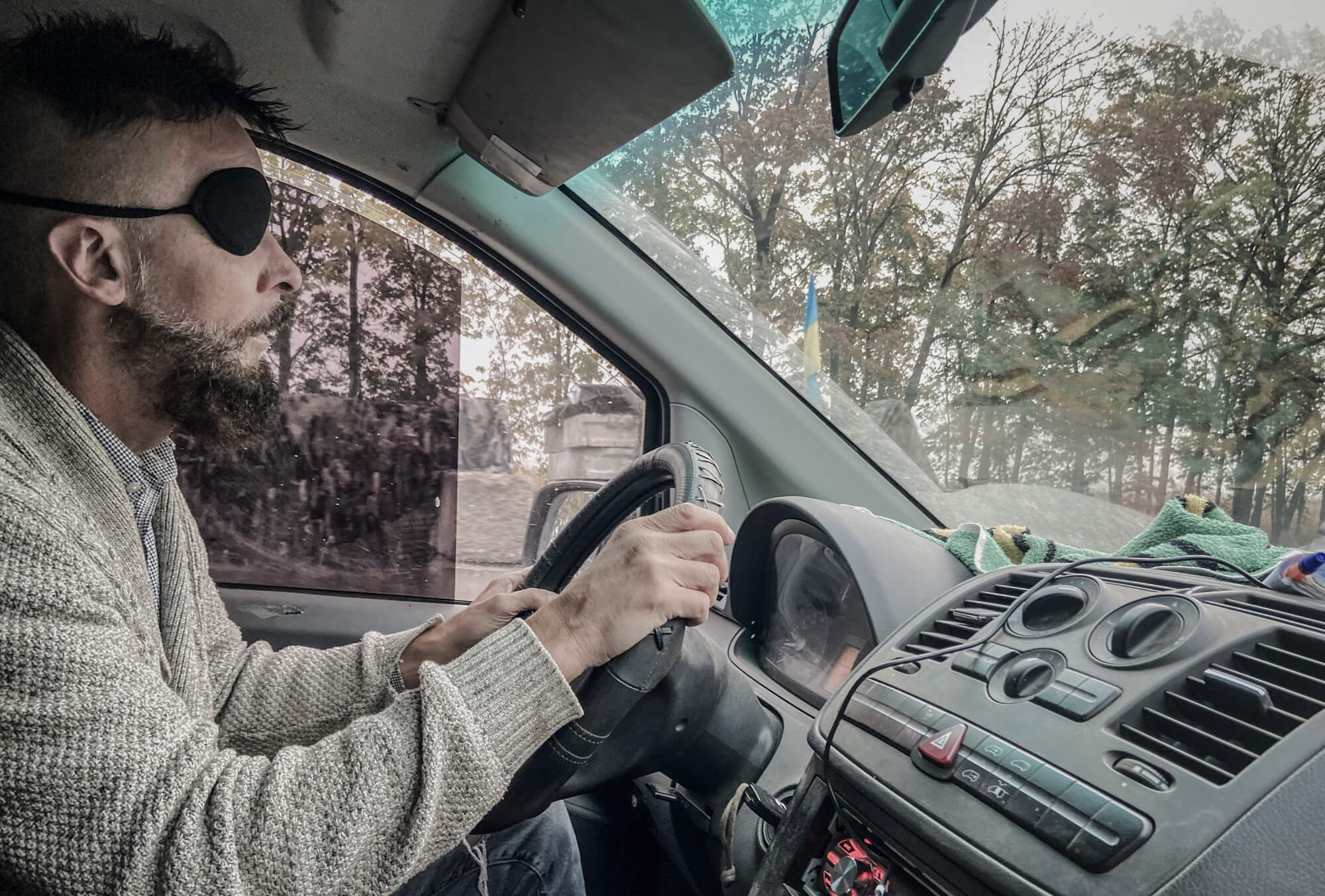
When his contract with the mobile operator ended, Dave used his experience as an engineer to develop his own small lighting business, producing floor lamps, table lamps, and wall and ceiling lights. The money he made was enough for a rented apartment almost in the center of the city and “a few pints of ale in a good company.” Before the full-scale invasion, Dave was living a fairly quiet life and never thought he would one day find himself at war.
“You are not afraid of explosions, are you?” he suddenly asks me, as we enter Kupyansk to the sounds of cannonade.
“I am only afraid of dying a foolish death,” I say calmly. “You know, I don’t want them to bring me home in a box and tell my mom: ‘We are sorry, but we still don’t understand why she ran into that minefield.’”
“Nobody wants to die,” he laughs. “But nobody knows what will ‘get’ them—or where.”
In the week after the liberation of Kupyansk, Russians continued to shell the town without letting up for a single day, using multiple launch rocket systems in particular. In response, Ukraine’s defense forces pounded them with heavy artillery, and although the sounds of outgoing fire are much more pleasant than the sounds of incoming one, I would still much prefer “oppressive silence” over the “roar of the battlefield.”
For Dave, it seems to be the opposite—he is always ready to run in whichever direction the fighting is louder. Others apparently think so too: While we are still sitting in his minibus, after the questions about fear, the Briton admits: some of his friends consider him an adrenaline junkie.
“But it’s not true,” he assures. “They simply don’t understand how it’s possible to risk so much for the sake of others. While I think that if you have already found yourself where you are, then you should be bold. Not reckless, you know? But bold, ready for action.”
On February 24th, when Russia openly attacked Ukraine, Dave was at home in Kyiv. He remembered massive, rolling explosions—the sounds of Ukrainian air defense. And even though he was scared by what was happening around him, that same day the man headed to the military enlistment office. Fifty-six years old, without combat experience, and not even a citizen of Ukraine, the expat had no chance of joining the Armed Forces. For a good hour, Dave tried to persuade the chief enlistment officer to “think, my friend,” but the colonel was adamant—he sent the man away and even jokingly asked him to “talk to his people so that they give Ukraine some real weapons.”
“I was disappointed,” he says emotionally. “Disappointed! Very sad. Well, 56 isn’t 80, is it? I’m sure that I could come in handy in the army. But it is what it is. I guess I’m meant to be where I am now.”
Loud and lively, Dave immediately dropped any grudge against the enlistment office, and, as soon as he returned home, began to look for other ways to help. In the first days of the invasion, the internet was flooded with requests to evacuate women and children, particularly from Kyiv. That would do just fine, but they were mostly looking for cars rather than drivers—as it turned out, there were more people with licenses than cars. At the time, Dave had no transport of his own, but from the number of requests, he decided: he would become an evacuation volunteer. “The only thing left,” he realized, “was finding a car.”
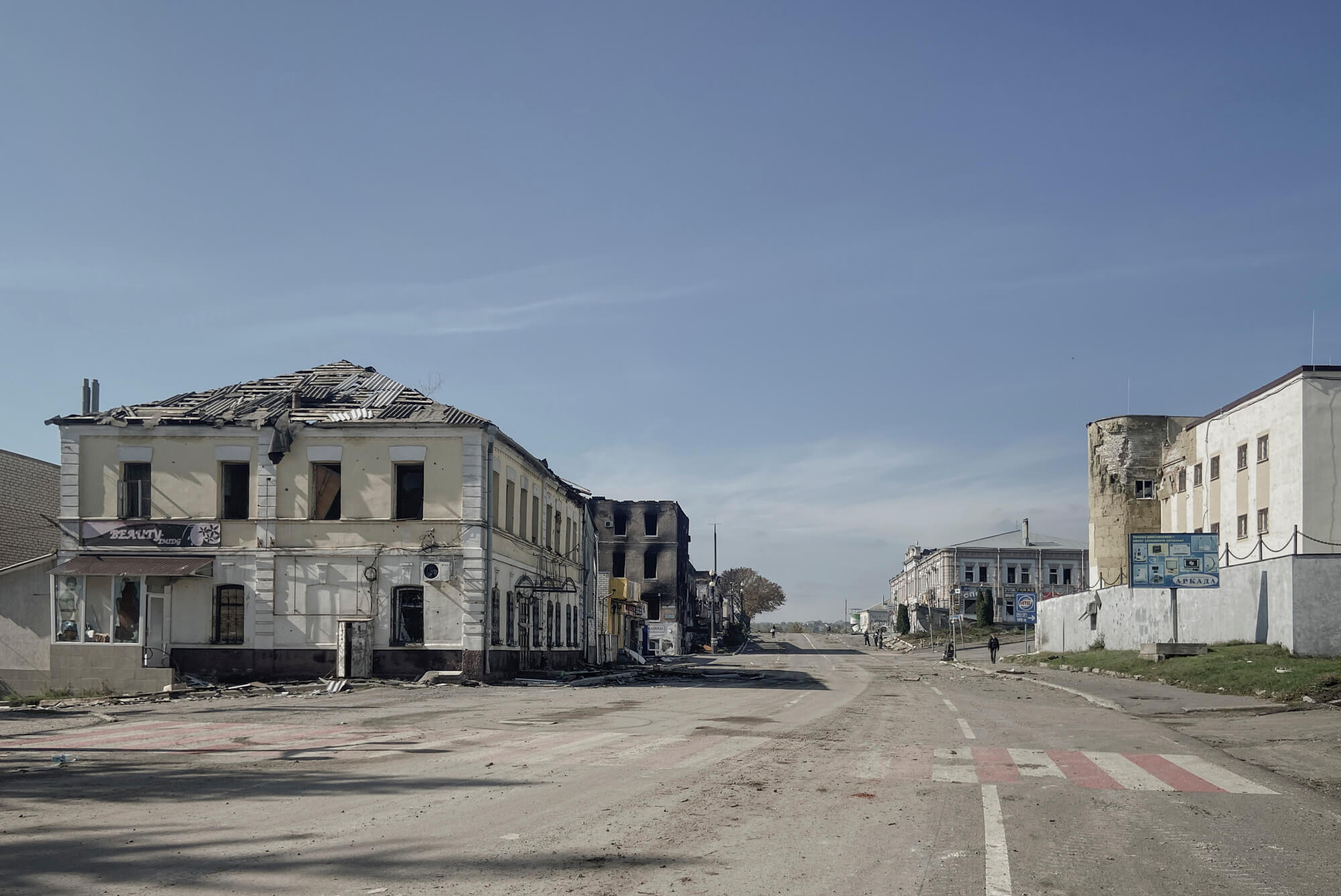
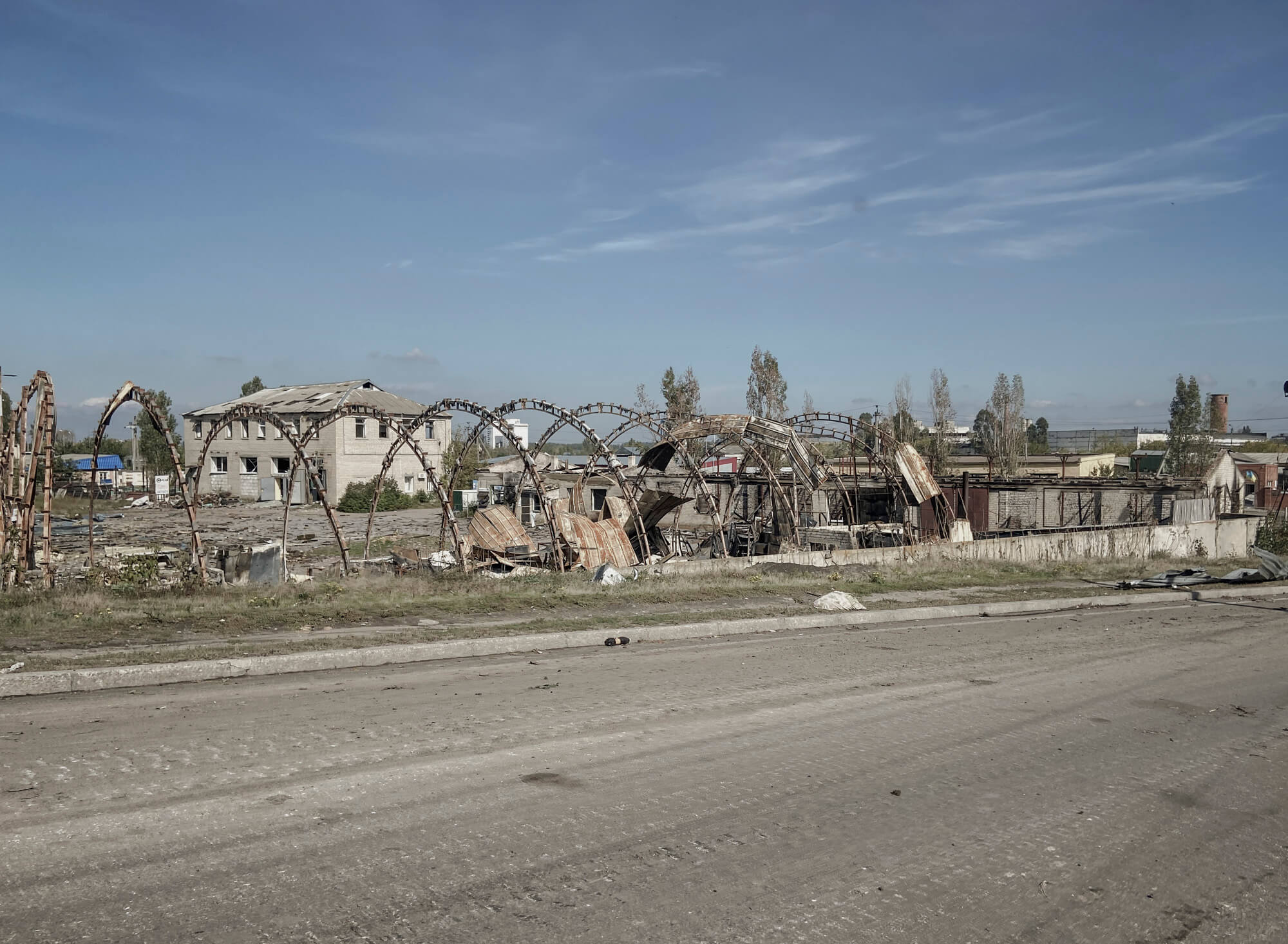
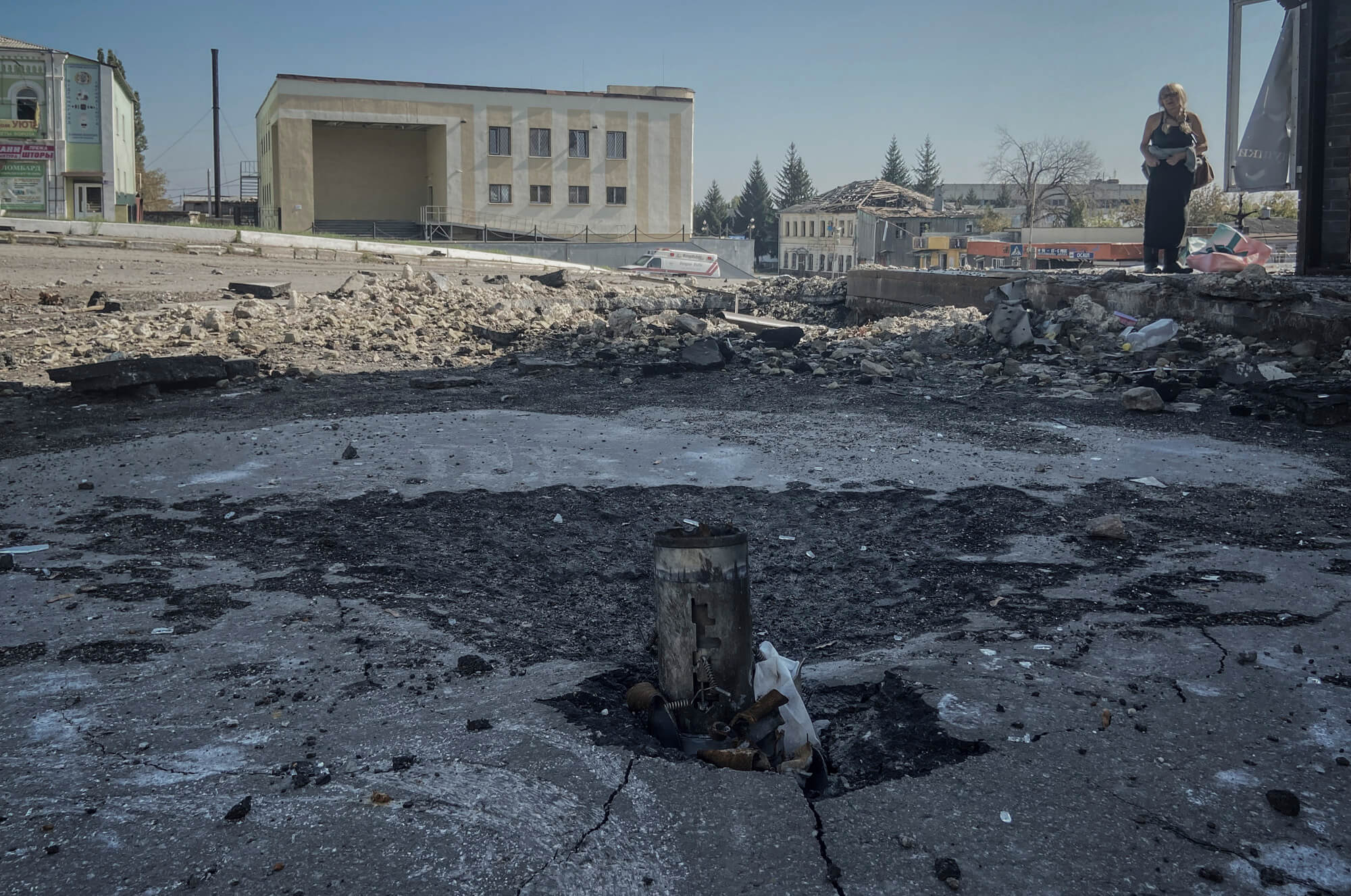
In March, the Briton joined charity workers who were engaged in the evacuation of people in need. At first, he drove other people’s cars, and a bit later, when the battles for Severodonetsk and Lysychansk were already raging, other volunteers provided him with his own vehicle—that same minibus we hurried in to Kupyansk.
A little patched up on the outside, from the inside the minibus looks somewhat less attractive: the roof above the driver’s head, parts of his seat, and the back of the interior are full of holes from shrapnel.
“These wheels have taken a beating,” I note.
“Me too. But the worst thing is that someone died in here,” sighs Dave.
With a stylish haircut, in torn and dirty jeans, the 56-year-old suddenly bursts into tears and it takes him a good while to regain his composure. His shoulders are shaking from сrying, but he is not embarrassed—bitterly and honestly, he is crying about what should not have happened.
“Sorry, I didn’t mean to. . .” I start to apologize, worried that I have upset him.
“That’s all right. It’s your job. I will tell you.”
During one of the evacuations in the Luhansk region, Dave’s navigation took him the wrong way. He was taking several civilians away from the shelling, but he missed a turn at speed and unexpectedly found himself in the thick of the battle. In fact, back then there was fighting on all of the roads there, but the man still believes things should have gone differently. He is unable to let go of the guilt over what happened.
“I wasn’t afraid for myself, but for the people I was evacuating,” he says loudly. “So I just pressed the gas pedal to the floor and prayed that we would get out of that hell as soon as possible. I have no idea how this happened. I was obliged to deliver everyone I picked up.”
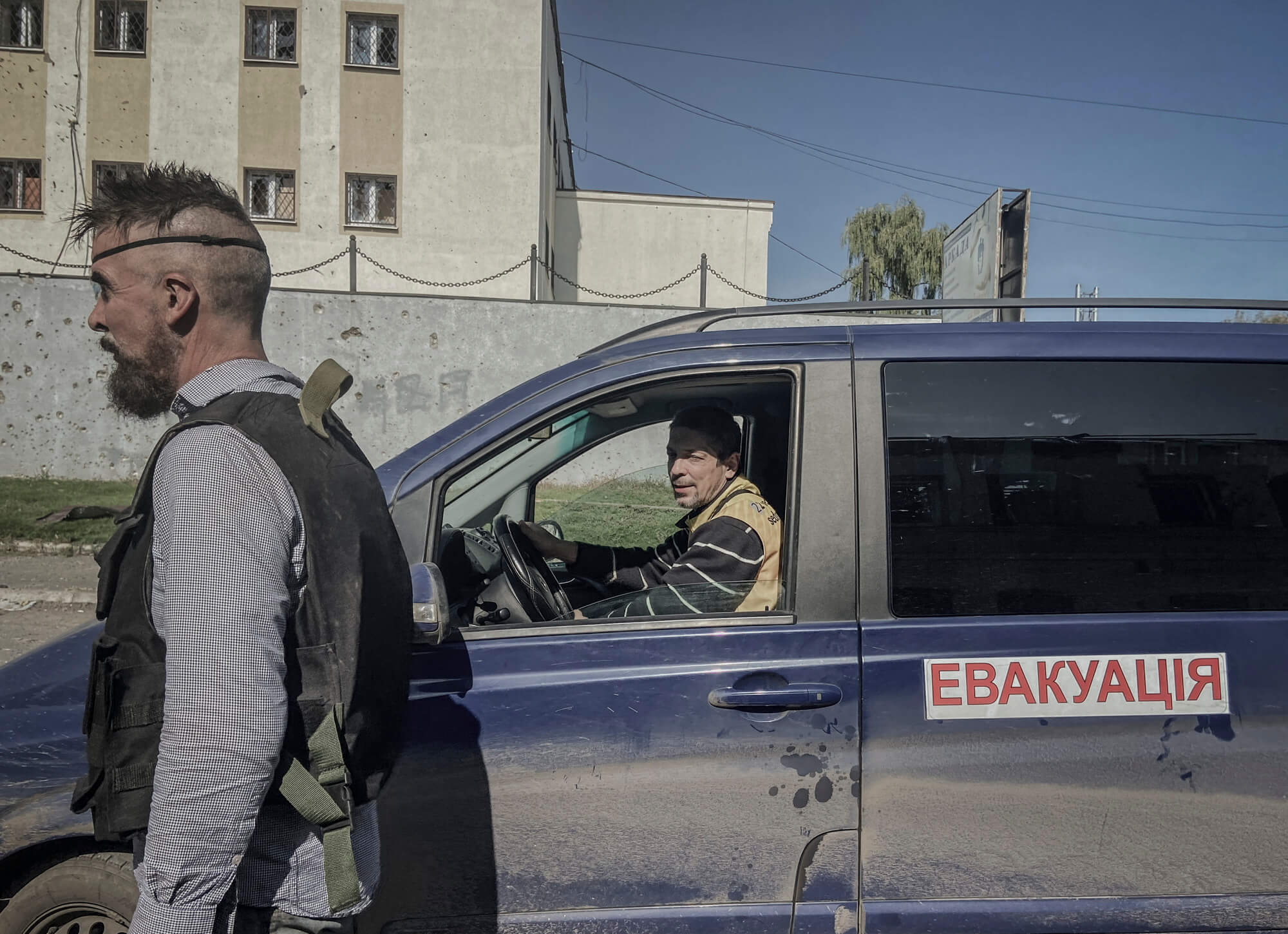
Actually, evacuation from the front line was never a quiet adventure, but Dave was usually lucky. That day was different, though. A shell from a “Grad” MLRS must have exploded in front of the volunteer’s minibus. Its fragments pierced the car: a large one took out Dave’s eye, and the second fatally struck a civilian who was sitting directly behind him. Out of six people in the car, only one woman was not hurt.
Friends and family urged Dave to take what happened as a sign or a lesson. The man listened but in his own way. Two weeks after the tragedy, he got behind the wheel of his minibus again. He put on a black eye patch to cover the missing eye, got the unofficial “Pirate” call sign, and swore “to dismiss his friends’ reproaches about the adrenaline junkie” and, no matter what, to keep on going to places other volunteers stayed away from.
“And today,” he taps his fingers on the steering wheel, “will be no exception. We will be doing real work—we will walk to the other side of the Oskil River, to the suburbs, where the people we need to evacuate live.”
Trusting is hard
If someone asked me if I had ever seen despair, I would answer that our paths crossed on the blown-up bridge in Kupyansk. Under incessant outgoing fire of our cannon artillery, several different worlds are forced to meet here.
First I see a military car pull up. Two sturdy soldiers jump out of it, pick up a stretcher with a wounded man under a thermal blanket, and carry him into an ambulance. A trickle of blood is running from the stretcher, and the man’s tattooed arm dangles off the edge as they move. One of the army men notices it swaying from side to side. “Fuck it, bro,” he shouts to the wounded man, “you will live! Enough of this shit! We’re done, the hospital is waiting.”
Then there is a completely wasted man in his 50s, staggering around. Stinky and dirty, he struggles to push his old bicycle, burdened with bags, and he yells to the sky: “My godfather has a holiday today! It’s his birthday!”
A little further, three paramedics in red vests with white crosses are running to an old woman with a trolley bag, who has just gotten out of the shelling and sat down in the middle of the bridge because she felt sick.
Dozens of people are flocking to the bridge on foot to cross the river and find an evacuation transport on the other side of town, while I am silently standing in the stream of other people’s lives, trying my best to commit to memory yet another episode of this war, for which I will hate Russians to the end of my days.
“Do you know the way?” I ask Dave, for he is confidently moving forward.
“I’ve got the addresses,” he says, not even looking in my direction.
“It’s good that you’ve got them,” I press on for more info. “But we must still have some kind of plan and understand exactly where we are going. What if there is a mined road or something?”
“Come on, everything will be fine, my friend!” he teases me. “Help is coming!”
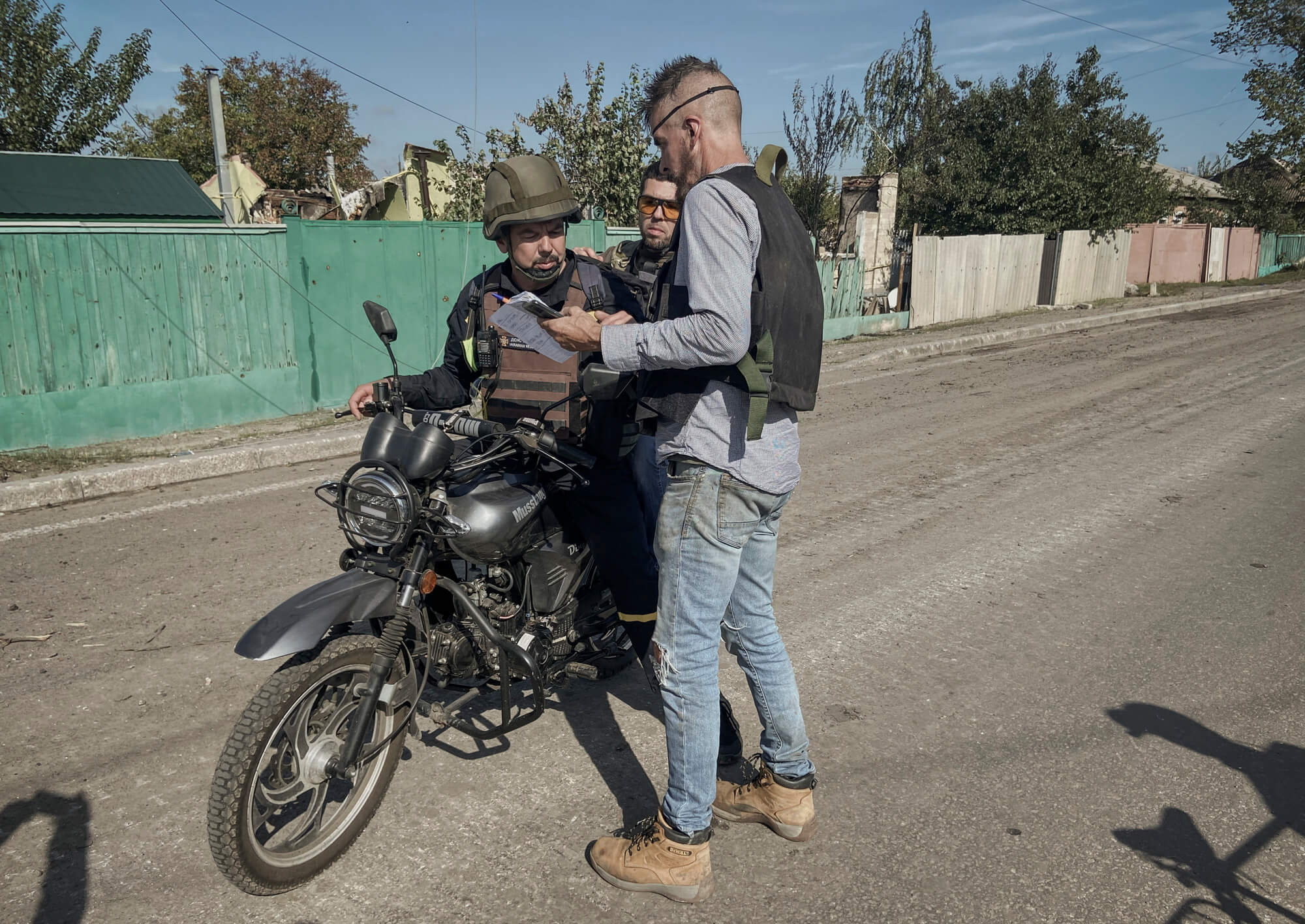
We are headed to the area behind the bridge, where the railway and the small house suburbs start. It has not yet been checked by sappers and humanitarian services. Otherwise, they would have already removed the bodies of killed Russians and of the farm pigs struck by fragments from MLRSs. I am not sure the Briton realizes all the danger we are in, but at some point, he finally heeds my request to look under his feet and stick to paved roads.
“Is it always like this?” I ask him. “You just go and check the addresses you found on the internet, without even knowing if there is anyone there at all or if they actually need to evacuate?
“And what did you expect?” he suddenly stops and asks me sternly in his usual broken Russian. “To find out if anything is really needed, we have to go and ask directly. There is no phone service here, and everything changes fast. We are doing real work now. While other volunteers just wait for people to reach them, we go ourselves to pick up the ones in need. Help is coming!”
Mobile service has long been gone in Kupyansk indeed, and online maps do not load; I entrust myself to Dave and we struggle to find our way. The street where all three of our addresses are located has more than a hundred private houses: some of them stretch along the railway track, and others are located further back towards the forest.
“Excuse me!” I shout to the first man we miraculously come across here.
“Would you please show us the way?” I ask because without him we will be wandering for a long time. “This is Dave, he is a volunteer. He wants to evacuate some locals from Kupyansk.”
The man goggles at us in surprise but agrees.
“Come on, I’ll show you, while there is no shelling,” he says.
The first address is a whitewashed, one-story house with a green metal gate and some marigolds beside it. I bang at the gate, calling and jumping up to see at least something in the yard. No one seems to be there.
“This is Dave, I’ve come to save you!” the Briton shouts the phrase he learned in Ukrainian as loudly as he can.
At this very moment, a large-caliber mortar shell whistles over our heads and lands in the suburbs nearby, but on the other side.
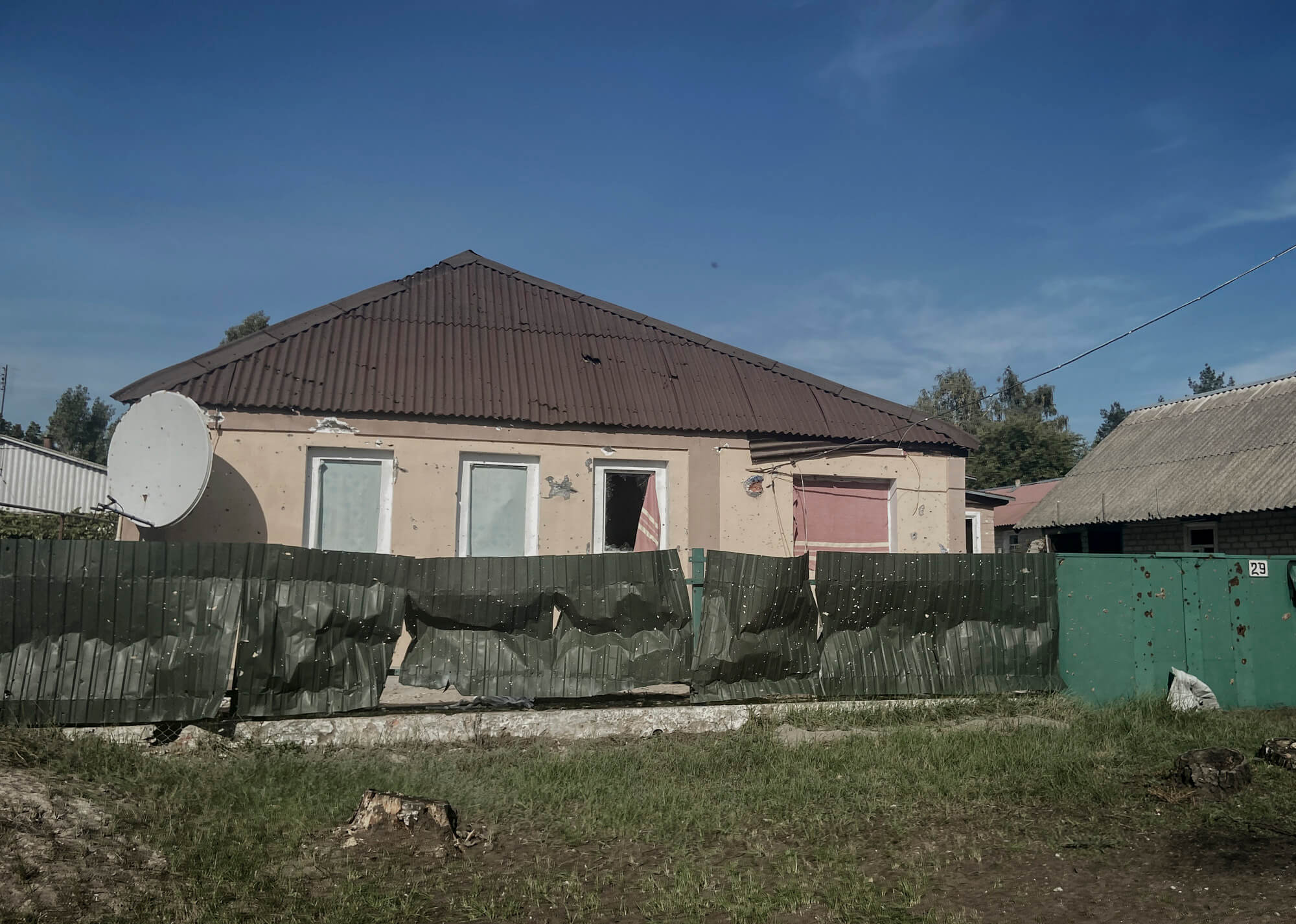
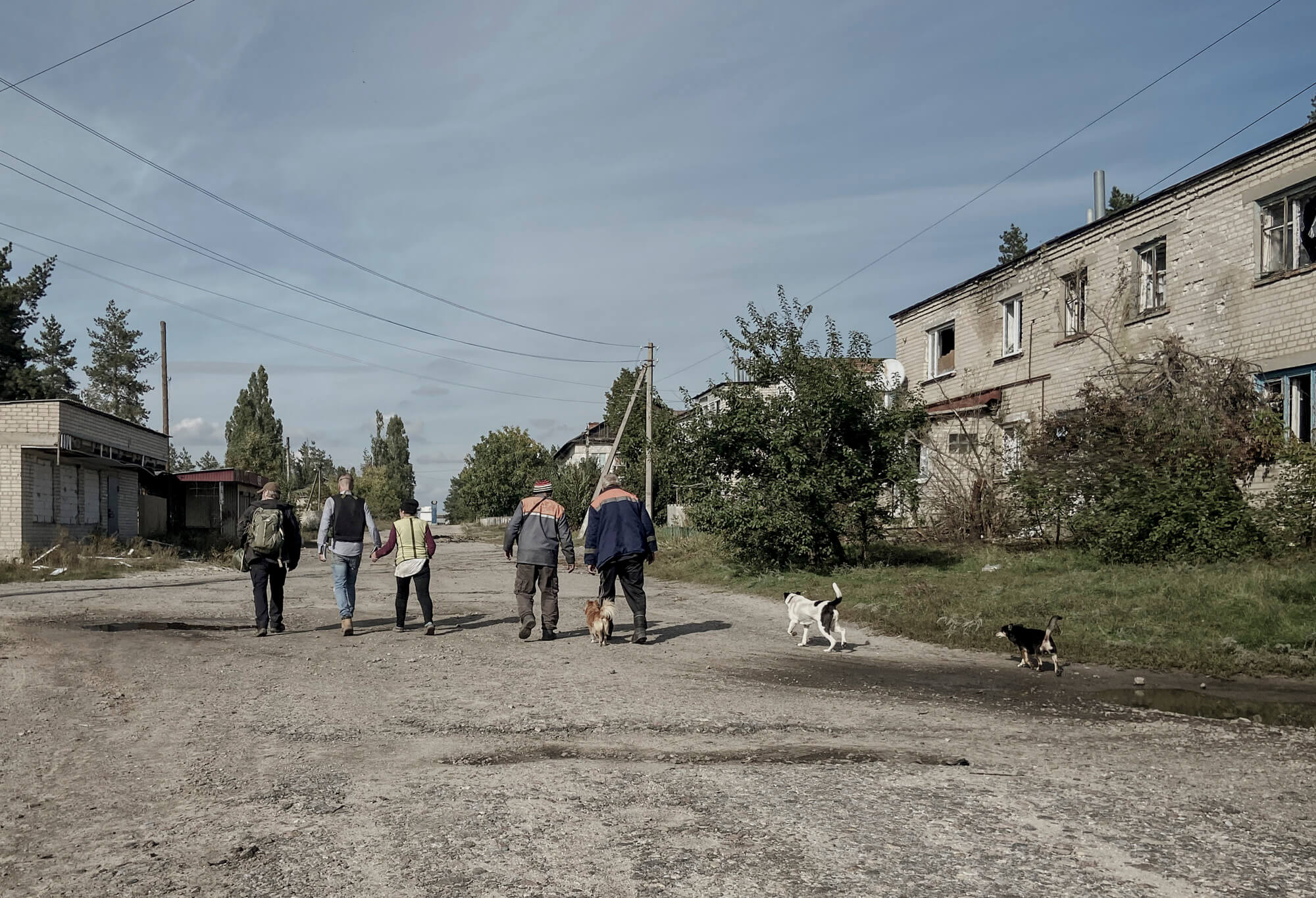
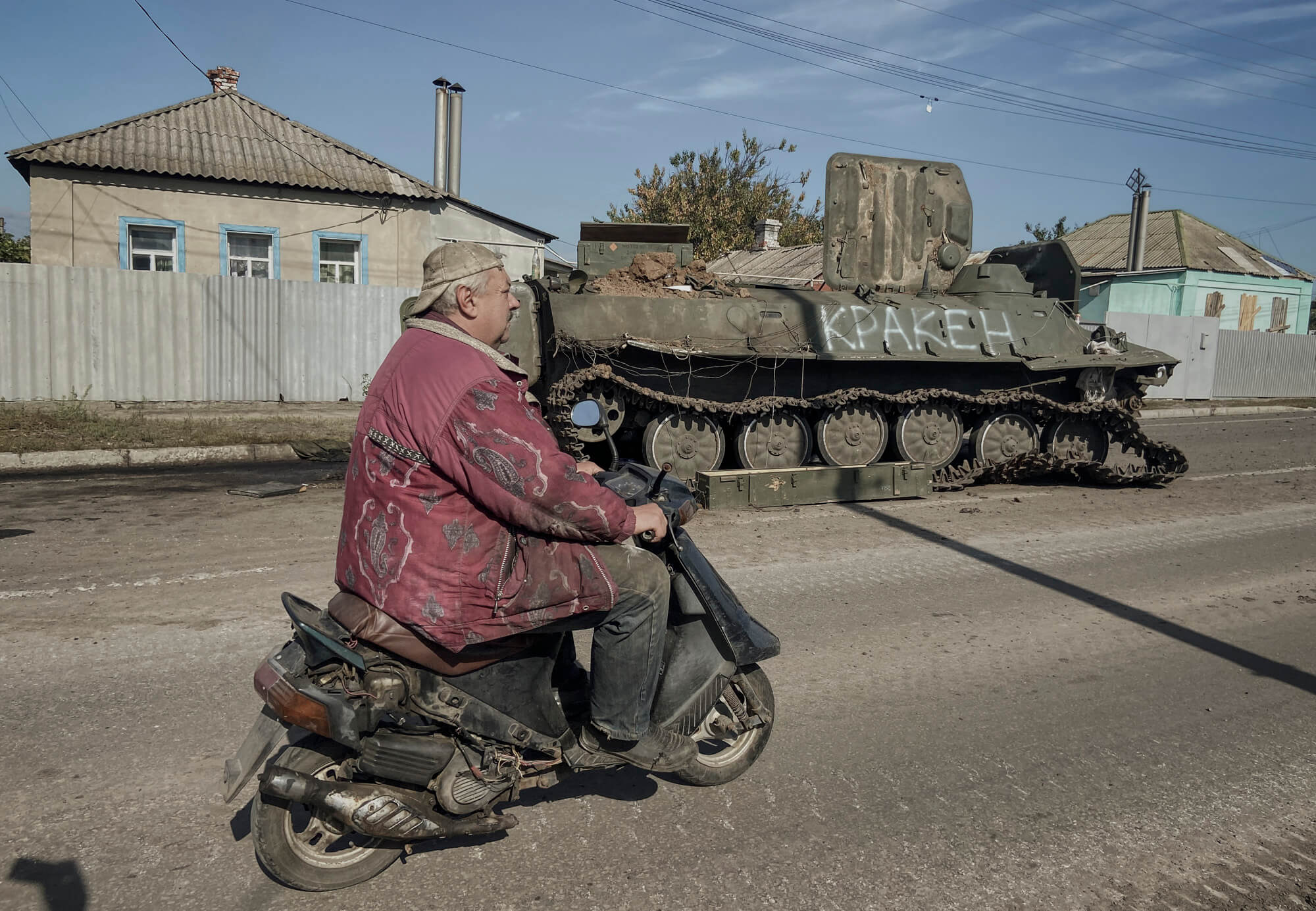
Dave calmly pulls out his mobile phone and starts recording: “We’re by your mom’s house right now,” he shows the number on the house. “But there is no one here. I shouted. I’ve checked everything. There are no people here. Most likely, your mom has already left. Don’t worry, I will ask other volunteers about her.”
The Briton has made a few dozen such videos in over six months of his volunteering, and he has evacuated more than a hundred people from the frontline areas. About one in five among those sought out by their relatives on the internet escapes the shellings before Dave arrives. And more or less one in three says they would prefer to stay at home—where the war continues, but also where they feel needed.
“That’s why,” the man explains, “I make these videos. The people need to know that I did get to the specified address, but their relatives either refused to leave or had left before I arrived. Sometimes I even film these people—they say that they are fine, that they hope for the best, and there’s simply no phone service. Then I send the recordings to those who were looking for their relatives and hope that these videos comfort them.
Our second and third addresses are located a 15-minute walk away. One is owned by an old man and the other by a mature couple, and they are nearly the only ones on the forest road that were destroyed by the enemy after the de-occupation of Kupyansk. The old man lives alone, and his niece is the one who asked Dave to check on him. As for the couple, they have a daughter who moved to Germany many years ago and is now looking for her parents.
“Anyone home?” I knock on the couple’s wicket.
“Yes, there is,” I hear a woman’s voice. “Who is it?”
Valentyna and Serhiy Vashchenko have been married for over 40 years. After retiring, these down-to-earth, hard-working people have been living off their own land and with the help of their son and daughter. They tried to invest their pension in the house, so they replaced the windows and patched up the walls shortly before the full-scale war. All of that money and effort was sadly for nothing, as now less than half of their family nest remains—almost everything was destroyed by a Russian mine.
For the past few weeks, Valentyna and Serhiy have been living in the basement. Hostilities had intensified in the town and suburbs even before the occupiers destroyed their house. Dressed in sweatsuits and sheepskin coats, they cry when Dave tells them he is here because their daughter from Germany is looking for them.
“I’m not going anywhere,” sobs the woman. “I will die here.”
“Valya, this is our chance, don’t be silly, I beg you,” says her husband.
Dave watches silently as the couple argues, and at that moment I decide to take charge.
“We have no time,” I say as sternly as I can. “Take your passports, your pets, and let’s go. What on earth are you thinking? The car is waiting behind the bridge. If the shelling begins, how do you think we’ll run there? People are waiting, you’re just letting everyone down now.”
Valentyna starts crying even harder, so I take her by the hand and tell her that my life now depends on her decision. “Don’t you understand that I’m not leaving without you?” I keep pressing. “What if they shell us now? Is this what you want? Come on, let’s go!”
While I try to persuade the woman, the stocky and gray-haired Serhiy gets a leather shoulder bag from the cellar and after ten minutes he comes back and reports: “We’re all set, I’ve packed our documents.”
In exactly the same way—by sternness, emotional blackmail, and stories about the car that won’t leave without us—we pull their neighbor, old Volodymyr, from his cellar next door. Everything happens quickly but, at the same time, feels very slow. I hear the whistling of enemy mines again.
On our way to the blown-up bridge, with one hand, I pull the half-conscious old man, and with the other, I carry Valentyna’s favorite dog, a dachshund mix named Grom.
“You are going to kill me, aren’t you? Will you shoot me?” asks the old man, barely making his next step.
“God,” I get angry, “why would you think that?”
“And why would a girl snoop around here? Moreover, in a foreigner’s company. Shoot me in the head, whatever—I won’t betray Ukraine.”
A helmet, a bulletproof vest, quite a heavy dog, and the words of the old man who sincerely thinks that we are going to kill him pressure me both mentally and physically. Dave seems to sense it, so he smiles and says: “People don’t trust volunteers, because, during war, trusting anyone at all is hard. But they will get to their relatives, and you will know that you have saved at least three lives.”
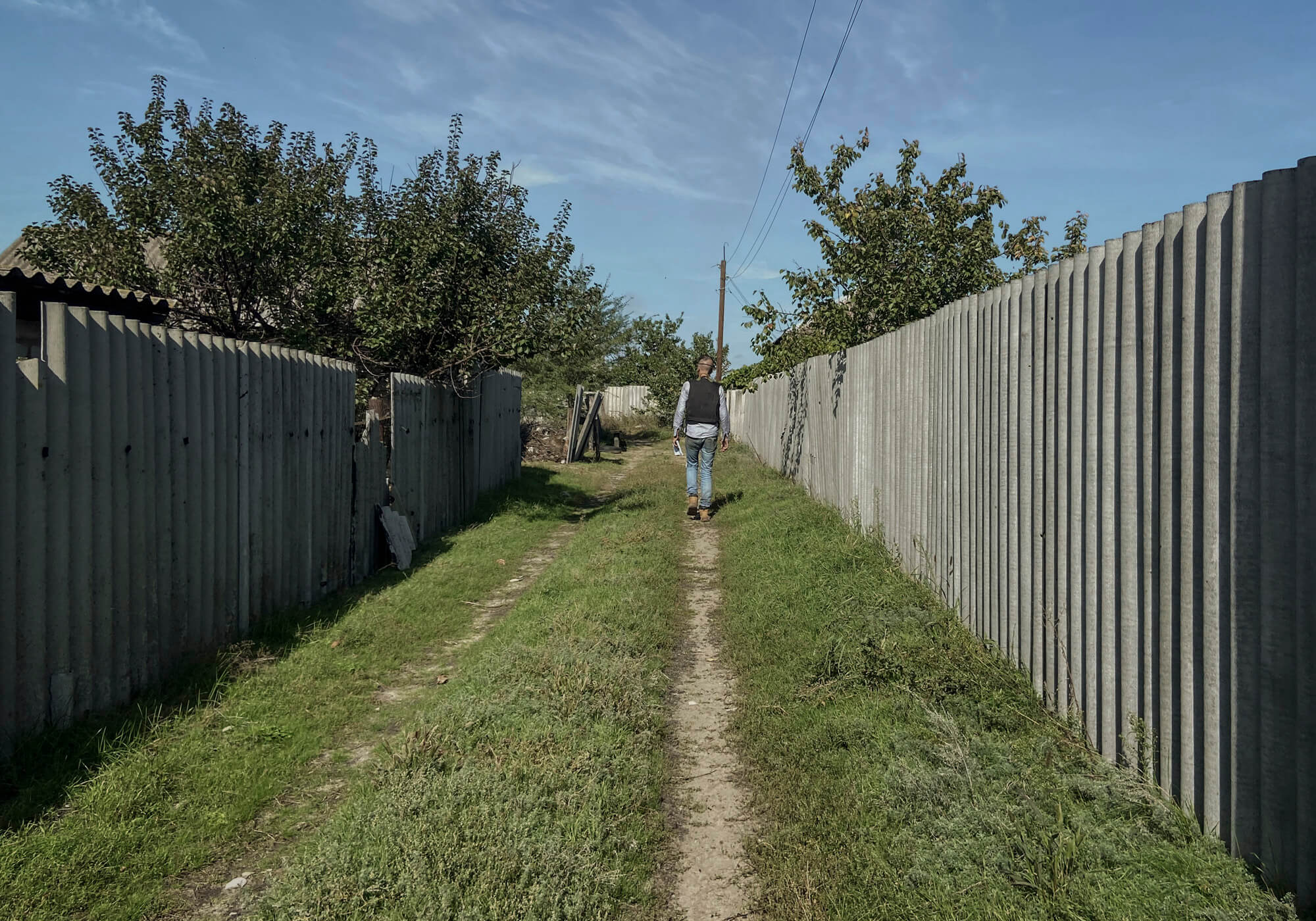
***
By the time of this story’s publishing, Serhiy and Valentyna Vashchenko were already in Germany with their elder daughter, who came to Lviv to pick them up. Grom the dog, who never in his life had any documents, was allowed to cross the border on the second attempt: Polish customs officers took pity on Grom and helped him get his vaccinations and papers because the couple refused to go without their dog. Old Volodymyr is now living with his sister in a village near Kupyansk, where there was no fighting. He realized that I didn’t want to kill him only after he had ascertained that Dave’s minibus was taking him to Ukrainian-controlled territory.
Besides the three people who we had to evacuate by foot, that day Dave also evacuated ten other residents of Kupyansk who were waiting for help at the bus station. For almost all of them, I bought tickets from Kharkiv to elsewhere in Ukraine from my own pocket. After all, Dave’s powers are limited to transportation: he sometimes helps people with dinner and overnight stays in Kharkiv, but he cannot cover their further expenses. Despite heavy fighting in parts of the Kharkiv region, there are no free evacuation trains running from the regional center. In Kharkiv, forced migrants are helped by other volunteers. Meanwhile, evacuations, both planned and unplanned, continue. By various estimates, there are currently 4 to 6.9 million internally displaced persons in Ukraine.
Have read to the end! What's next?
Next is a small request.
Building media in Ukraine is not an easy task. It requires special experience, knowledge and special resources. Literary reportage is also one of the most expensive genres of journalism. That's why we need your support.
We have no investors or "friendly politicians" - we’ve always been independent. The only dependence we would like to have is dependence on educated and caring readers. We invite you to support us on Patreon, so we could create more valuable things with your help.
Reports130
More






